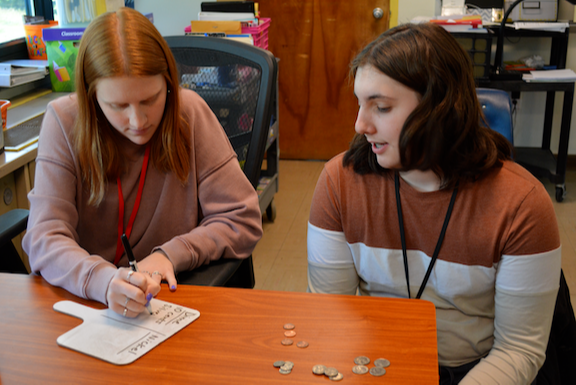PPS Navigation

Answers to Frequently Asked Questions (FAQ)
REFERRAL AND EVALUATION
What do I do if I am worried about my child’s progress and wonder if they are eligible for special education? Where do I start?
It is best to start at the school level by reaching out to your child’s teacher to discuss your concerns. It may also be helpful to also discuss your concerns with the school counselor or principal at your child’s school. These members of your child’s school-based team can assist you in determining if a referral to special education is needed. For children who are preschool age, parents/guardians can contact the Early Childhood Coordinator.
Can parents/guardians request an evaluation for special education services?
Yes, when you request that your child be evaluated for special education this is called a referral. You can request an evaluation at any time. Your child’s teacher or other school personnel can also recommend that your child be evaluated for services. When you or school personnel make a request for an evaluation, the Evaluation Team will convene to review the concerns and determine if there may be a disability and whether your child requires an evaluation to make this determination.
How long do school districts have to evaluate my child for special education?
The Rhode Island Regulations Governing Student with Disabilities allow for up to 60 calendar days after parent/guardian consent to evaluate and make an eligibility determination.
If my child has a medical diagnosis and I believe they require special education, do I need an evaluation?
A medical diagnosis does not necessarily mean that the student is eligible for special education and related services via an Individualized Education Plan. In these cases, the Evaluation Team will review and consider the information that you provide to make determinations regarding the need for further evaluations.
ELIGIBILITY DETERMINATION
What happens if my child is found eligible for special education?
Your child’s eligibility for special education services is based on whether your child has a disability that fits into one of the IDEA’s disability categories and meets the criteria for eligibility. This decision will be made when the evaluation has been completed, and the results are available. Parents/guardians are part of the team that decides a child’s eligibility for special education. This team will look at all of the information gathered during the evaluation and decide if your child meets the definition of a “child with a disability.” If so, your child will be eligible for special education and related services.
What happens if my child is not eligible for special education services via an IEP?
If your child is not eligible for special education services, the school-based team will discuss other options with you such as a Section 504 Accommodation Plan, further intervention plan, or offer other suggestions with regard to your child’s needs.
INDIVIDUAL EDUCATION PROGRAM (IEP)
What is an Individualized Education Plan (IEP)?
The Individualized Education Plan is a written plan that details the specially designed instruction and related services that must be provided to each student who receives special education services. Parents/guardians and school personnel work together to write the IEP. It must be reviewed and revised every year.
How often are IEP meetings held?
IEP meetings are held at least annually and within ten school days when requested by a parent/guardian. You can request an IEP Team meeting at any time, and the IEP Team will schedule a meeting within ten school days.
How should I prepare for the IEP meeting?
It is important for you to come to the IEP meeting with any questions or concerns you may have regarding your child’s school program. Reviewing your child’s schoolwork, sharing information including any recent evaluations or other documents that might be helpful to the team, offering suggestions, and actively participating in the IEP process are an important part of working collaboratively with the school team.
What if I don’t agree with part or all of the proposed IEP?
Your child’s team is committed to collaborating with you on behalf of your child and their IEP. Should you disagree with the proposed IEP, contact your child’s case manager to request a meeting to review the proposed IEP and address your concerns. However, you may decline special education and related services for your child at any time. It is important to note, however, that if you decline or cancel special education for your child and later change your mind, the initial evaluation process will need to be repeated.
LEGAL MATTERS
What are the Procedural Safeguards? (RI Special Education Procedural Safeguards Notice)
The procedural safeguards are a set of requirements that explain regulations of IDEA to protect the rights of children with disabilities and their families, particularly in regard to the access to free appropriate public education (FAPE). Procedural safeguards describe the rights of a parent of a child with a disability and the procedures that safeguard those rights under state and federal special education law.
What is a Section 504 plan?
Section 504 is not a special education law. It is a section of the Rehabilitation Act of 1973. Section 504 prohibits discrimination against persons who are disabled, including both students and staff members, by school districts receiving federal funding. All individuals who have exceptional needs under the Individuals with Disabilities Education Act (IDEA) are also considered to be disabled and therefore protected under Section 504. However, all individuals who have been determined to have a disability under Section 504 may not have exceptional needs under IDEA.
The IDEA defines eligible students who have certain specified types of disabilities and who, because of one of those conditions, need special education (specially designed instruction). Section 504, on the other hand, protects all students who are disabled, defined as those having any physical or mental impairment that substantially limits one or more major life activities. Section 504 covers all students who meet this definition, even if they are not eligible for special education under one of the IDEA enumerated categories and even if they do not require an Individualized Education Plan (IEP). A Section 504 Plan is protection for students who may need accommodations in the general education program but are not eligible for IDEA special education services.
Do you have other questions? Talk to your child’s teacher, principal, or contact the Pupil Personnel Services team.
